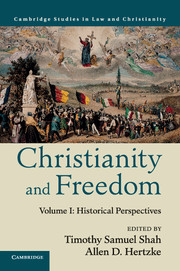Book contents
- Frontmatter
- The Religious Freedom Research Project
- Contents
- Contributing Authors
- Acknowledgments
- Introduction: Christianity and Freedom: Ancient Roots and Historical Innovations
- 1 The Roots of Religious Freedom in Early Christian Thought
- 2 The Christian Roots of Religious Freedom
- 3 Lactantius on Religious Liberty and His Influence on Constantine
- 4 Augustine and Religious Freedom
- 5 Christianity and the Roots of Human Dignity in Late Antiquity
- 6 Liberty of Conscience and Freedom of Religion in the Medieval Canonists and Theologians
- 7 Faith, Liberty, and the Defense of the Poor: Bishop Las Casas in the History of Human Rights
- 8 Calvinist Contributions to Freedom in Early Modern Europe
- 9 Constitutional Protection of the Freedom of Conscience in Colonial America: The Rhode Island and Pennsylvania Experiments
- 10 Christianity and Freedom in the American Founding
- 11 Vibrant Christian Pluralism and the Evolution and Defense of Religious Liberty in America
- 12 Orthodox Christian Contributions to Freedom: Historical Foundations, Contemporary Problematics
- 13 Christianity: A Straggler on the Road to Liberty?
- 14 Protestant Missionaries and the Centrality of Conversion Attempts for the Spread of Education, Printing, Colonial Reform, and Political Democracy
- 15 God and Freedom: Biblical Roots of the Western Idea of Liberty
- Index
10 - Christianity and Freedom in the American Founding
Published online by Cambridge University Press: 05 May 2016
- Frontmatter
- The Religious Freedom Research Project
- Contents
- Contributing Authors
- Acknowledgments
- Introduction: Christianity and Freedom: Ancient Roots and Historical Innovations
- 1 The Roots of Religious Freedom in Early Christian Thought
- 2 The Christian Roots of Religious Freedom
- 3 Lactantius on Religious Liberty and His Influence on Constantine
- 4 Augustine and Religious Freedom
- 5 Christianity and the Roots of Human Dignity in Late Antiquity
- 6 Liberty of Conscience and Freedom of Religion in the Medieval Canonists and Theologians
- 7 Faith, Liberty, and the Defense of the Poor: Bishop Las Casas in the History of Human Rights
- 8 Calvinist Contributions to Freedom in Early Modern Europe
- 9 Constitutional Protection of the Freedom of Conscience in Colonial America: The Rhode Island and Pennsylvania Experiments
- 10 Christianity and Freedom in the American Founding
- 11 Vibrant Christian Pluralism and the Evolution and Defense of Religious Liberty in America
- 12 Orthodox Christian Contributions to Freedom: Historical Foundations, Contemporary Problematics
- 13 Christianity: A Straggler on the Road to Liberty?
- 14 Protestant Missionaries and the Centrality of Conversion Attempts for the Spread of Education, Printing, Colonial Reform, and Political Democracy
- 15 God and Freedom: Biblical Roots of the Western Idea of Liberty
- Index
Summary
In a brief work of synthesis such as this, it may be useful first to say what is not my subject. I do not propose to say much about the very old and mostly distracting argument about whether the United States is, or was founded as, a “Christian nation.” The expression has the kind of equivocal character that invites disputatious question begging. No one means to say the United States is a “confessional Christian state that merges political and ecclesiastical authority.” The label has also frequently been taken to mean something like “an essentially Christian political order founded on a scriptural basis,” but this claim is nearly as implausible. But if what is meant by “Christian nation” is “a nation made up largely of Christian people, governed by a secular political order they see as properly enmeshed in a relation of mutual support with their religious faith,” then that claim is more than merely plausible. Indeed, it seems undeniably true.
Neither is it my purpose here to rehearse yet again the almost equally hackneyed debate over the private religious views of the leading members of the founding generation, and the impact of those views on the principles of the American Revolution they led and the constitutional system they created. A great deal of ink has been spilled over the Christian beliefs – or lack thereof – of George Washington, John Adams, Thomas Jefferson, James Madison, and other major figures of the founding, as well as their views on church-state relations. I do not intend to spill more such ink here, other than to observe that the major founders, as members of a highly educated elite in an intellectually turbulent century, were unsurprisingly a disproportionately heterodox class of men, whose religious views should not be taken for granted as demographically representative of the nation they led.
My purpose here is both more limited and broader. I argue that in the American founding, Christian elements of historic belief, diverse practice, and common moral norms formed the warp of the nation's fabric (the threads first stretched on the weaver's loom), while the weft (or woof, the threads woven through the warp at right angles) was a set of mostly complementary, but sometimes contrasting political ideas of sometimes secular, certainly modern, occasionally heterodox, or simply practical origin.
- Type
- Chapter
- Information
- Christianity and Freedom , pp. 264 - 289Publisher: Cambridge University PressPrint publication year: 2016



